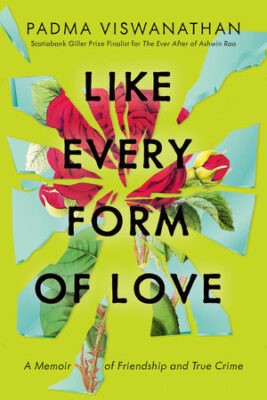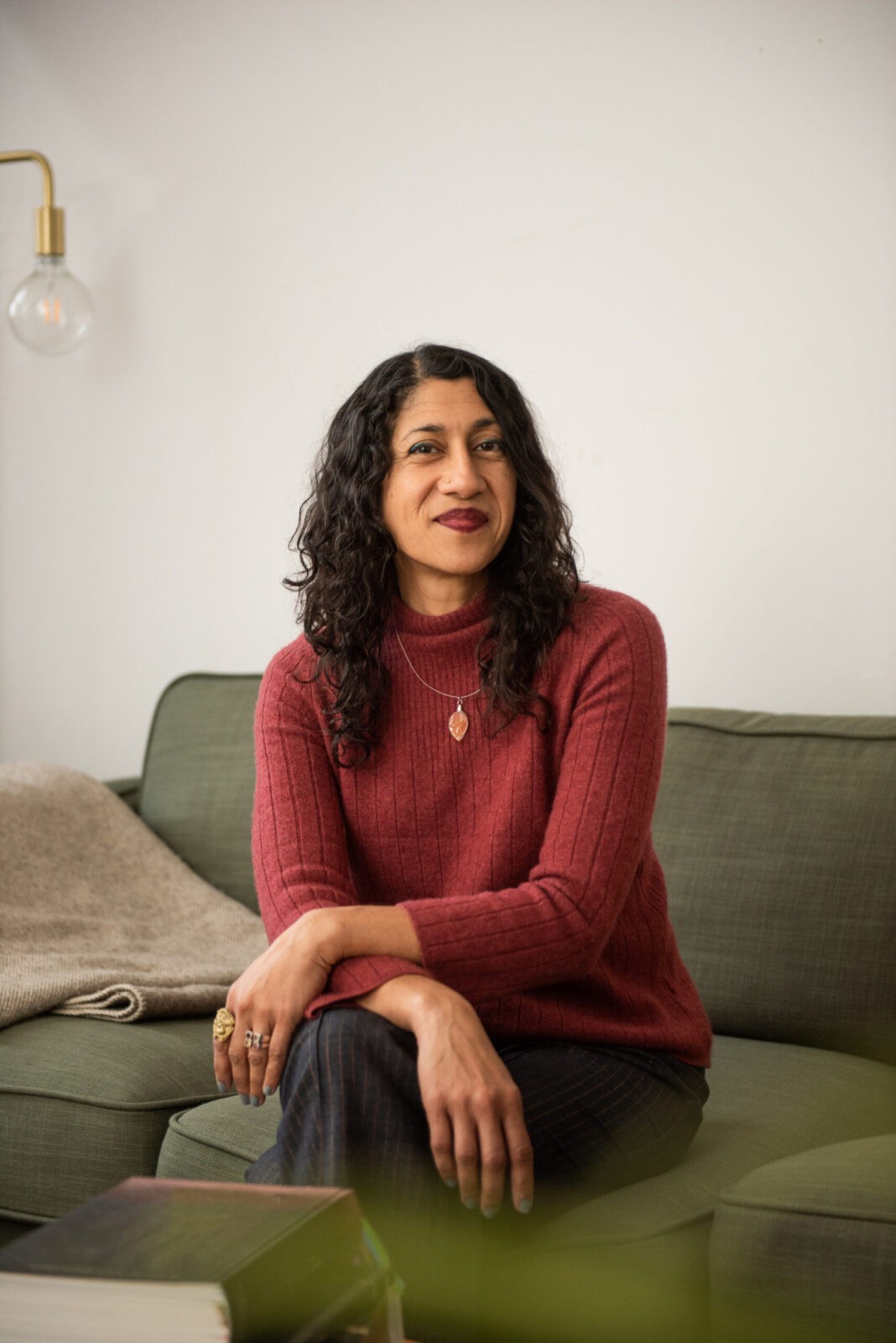Padma Viswanathan’s Like Every Form of Love is hard to classify. The subtitle, “A Memoir of Friendship and True Crime,” comes close, but only scratches the surface of this complex and profound work.
A novelist, translator, and teacher, Viswanathan divides her time between Montreal and Fayetteville, Arkansas, where she and her husband, poet Geoffrey Brock, both work as professors at the University of Arkansas. “Like many Canadians, I never even said the word Arkansas before I ended up moving there,” she laughs. “It doesn’t have the kind of urban vibrancy that Montreal has, and I admit to having really missed that.” But she describes the small college town with fondness, adding that “Montreal is also a city of villages… in that way, the places are not that dissimilar.” On a phone call during one of her Montreal sojourns in late 2023, she tells me about some of the themes and challenges of her latest, utterly unique piece of writing.
Like Every Form of Love Random House Canada
A Memoir of Friendship and True Crime
Padma Viswanathan
$35.00
cloth
296pp
9781039006201
Like Every Form of Love is a book with a lot of digressions and unpredictable twists, both narrative and thematic. It’s difficult to summarize without spoilers, especially since each new revelation throws previous assumptions into doubt. Amid these threads, Viswanathan weaves a series of Hans Christian Andersen fairy tales – a side quest that’s as delightful as it is unexpected.
A fan of Andersen’s tales since childhood, Viswanathan found her interest in the author rekindled when she read them to her own children. “And then this wonderful biography by Jackie Wullschlager [Hans Christian Andersen: The Life of a Storyteller, 2000] was published,” she recalls. “And when I read that, I learned what an interesting figure he was as a person, as an artist. He was queer, and his biography spreads throughout his amazing tales.” Unlike his predecessors the Grimm brothers, who collected their famous fairy tales from regional oral stories, “Hans Christian Andersen was one of the first modernists. His tales were originals, even if they drew on many sources and folklore around him,” Viswanathan explains in full lit-prof mode.
“When I came to write Like Every Form of Love, I realized that three of my favourite stories sort of dovetailed perfectly with the ambivalences that I wanted to illustrate in this book,” she continues. She describes “The Snow Queen” (from which Disney’s Frozen franchise is very loosely adapted) as simply “the story of two friends on a journey,” although her book explores its narrative and symbolism in much more detail. “The Ugly Duckling,” meanwhile, is “a story of becoming, a story of learning to recognize who you are, and it’s the story that [Andersen] considered his most autobiographical. And it seemed a wonderful allegory to demonstrate this painful, but also beautiful, process that my friend underwent in coming to own his own sexuality.”
The third Andersen story is where the most compelling allegory comes through: “‘The Shadow’ – which is about the internal schism that many writers feel, of wanting to be part of life but needing to be outside it, feeling like we need to embrace our own darkness to be able to say something true – this seemed to be a way to communicate to the reader what I felt I went through emotionally trying to tell this story.”
Indeed, Viswanathan struggles throughout with how she can tell Phillip’s tale – both internally, in her writing process, and in terms of how the experience challenges her friendship with him. The conflict between her roles as friend and writer is present from early on – she writes in a diary entry after meeting Phillip that she must “kill the butterfly in order to preserve it,” a surprisingly dark and violent metaphor that inescapably complicates her frequent, and genuine, expressions of love for her difficult and tormented friend.
The book also lays bare the unglamorous realities of a writer’s life, from unproductive writers’ retreats to dealing with discouraging feedback from professional and personal relations. This could have risked being a little too precious, were it not for Viswanathan’s brutal honesty about her own failings; as she documents, Like Every Form of Love is the result of a third attempt to capture the story, after abandoning two earlier efforts. “I couldn’t pretend that I had written it out of some easier process. I failed miserably at it, twice,” she laughs. “And it was out of that that this book emerged, for whatever it is.” About her choice to include the warts-and-all elements of her process, she says: “It didn’t really feel like a decision. I wrote that third iteration in like ten weeks. After twenty-plus years of thinking about this story, I felt like I was following it more than generating it. Part of that was just trying to be as absolutely honest as I could about what this was and what it had been.”
In this same spirit of honesty, Viswanathan is forthright with her mixed feelings about leaning into the “true crime” element of Phillip’s stepmother Del and her murky past, an intriguing and multifaceted story that could almost have constituted its own book. “I confess to my snobbery about the genre,” she admits. But the story “does contain true crime elements, so it would be kind of dishonest not to include that. I sort of didn’t want to, but at the same time, a huge part of what intrigued me about the book was this true crime story at the heart of it,” she says. “I think if I have a problem with true crime, it’s probably with the way it pretends that questions – say, about motivation, about psychology – can be answered. But often, those real meanings might elude us or might shift over time.”
This ambiguity is at the heart of Like Every Form of Love, a book both intimate and universal in its exploration of writing, friendship, and the human desire for closure that remains stubbornly out of reach. “It used to be that when people asked me why I write, I said that it was because I was attracted to unanswerable questions,” Viswanathan says. “But writing non-fiction really made me confront that, because people want their questions answered. I wanted my questions answered. But even when they were, ambiguity still remained. And I had to make my peace with that – with what was quote-unquote true, with what I believed, with what couldn’t be known.”
Vishwanathan may not have all the answers, but she poses the questions beautifully in this achingly honest book that stimulates the heart and mind at all levels.mRb







0 Comments